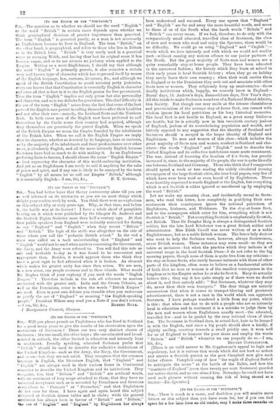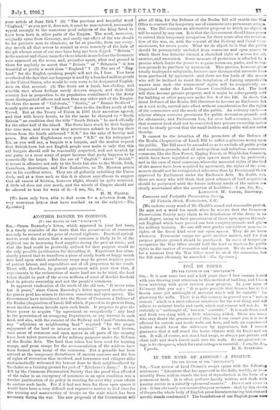[TO TUE EDITOR OF TUE "SPECTATOR."]
SIR,—There is much in a name, and doubtless you will receive more letters on this subject than you have room for, but if you can find space for a few lines from an old reader, may I make three remarks on
your article of June 24th? (1) "The precious and beautiful word ' England,' " as you put it, does not, it must be remembered, necessarily appeal strongly to the numerous good subjects of the King fated to have been born in other parts of the Empire. The word, moreover, originally came from Germany, and surely one effect of the war should be for patriotic men to eliminate, as far as possible, from our every- day speech all that serves to remind us even remotely of the hole of the pit whence some of our race have long ago been digged. " Britain " is the ancient and classic name for these islands in use before the Germanic race appeared on the scene, and, prejudice apart, what real ground is there for anybody to assert that " Britain " or " Britannia " is less beautiful or poetic a word than " England " ? (2) The use of " Eng- land" for the English-speaking people will not do, I fear. You have overlooked the fact that our language is used by a hundred million people in the United States, who would be very sorry to be designated English- men on that account. (3) The Scots are a loyal, law-abiding, and sensible race whose feelings surely deserve respect, and their little country has in proportion to its population contributed to the Army more distinguished officers and men than any other part of the Empire. To them the name of "Caledonia," "Scotia," or "Bonnie Scotland" sounds quite as sweet as " England " does to the dwellers south of the Tweed. But at the Treaty of Union in 1707 their ancestors agreed, and that with heavy hearts, to let the name be changed to "North Britain" on condition that the title "South Britain" be used officially for the other half of the island. The Soots have stuck by their bargain like true men, and even now they sometimes submit to having their letters from the South addressed " N.B." for the sake of brevity and peace. But what Englishman ever puts " S.B." on his notepaper ? No, as you well say, a bargain is a bargain, and the modest request that British-born but not English people now make is only that this old bargain should still be reasonably respected, and not treated by one party as a mere scrap of paper because that party happens to be numerically the larger. But the use of " English " where "British" is meant is offensive not only to the Scots but also to the Welsh, Irish, Canadians, Australians, and New Zealanders, as Mr. Marston points out in his excellent letter. They are all gallantly upholding the Union Jack, and at a time such as this it is almost superfluous to suggest that all causes of friction, however slight, should be quite removed. A little oil does not cost much, and the wheels of Empire should not be allowed to heat for want of am, Sir, &c.,
H. M. CADELT...
[We have only been able to find room for a selection from the very numerous letters that have reached us on the subject.—En. 8pretaior.]











































 Previous page
Previous page